The construction industry runs on relationships, coordination, accuracy, and trust. Whether you are a general contractor, builder, subcontractor, or project management firm—your ability to manage bids, track client communications, schedule follow-ups, manage project documents, and handle service requests directly impacts your profitability.
This is why choosing the right CRM for construction is no longer optional—it is essential.
The right CRM for construction companies helps you:
- Track leads and job opportunities
- Manage bids and proposals efficiently
- Improve field and office communication
- Store project documents securely
- Automate workflows and approvals
- Offer better visibility and reporting
- Strengthen client and subcontractor relationships
In this guide, we will explore the 10 Best CRM for Construction Companies in the USA, discuss what features to look for, compare pricing, and help you choose the best solution for your business.
We will also show how B2Sell CRM Integration helps construction businesses connect CRM with ERPs, accounting systems, supplier platforms, and more—ensuring smooth data flow across your operations.
What is CRM for Construction?
CRM for construction is specialized software designed to help construction businesses manage communication, leads, estimates, proposals, project workflows, subcontractors, clients, and after-project follow-ups—all in one centralized platform.
Unlike generic CRMs, a construction CRM understands:
- Construction sales pipelines are long and complex
- Most deals involve bidding and negotiations
- Projects require collaboration between multiple teams
- Field workers need mobile access
- Documentation and compliance are critical
In simple terms:
A CRM for construction keeps everyone on the same page—from office teams to field crews—ensuring smoother operations and better project outcomes.
Why Do Construction Companies Need a CRM?
Construction companies deal with multiple moving parts. Without a CRM:
- Leads get lost
- Job costing becomes unclear
- Miscommunication delays projects
- Customer experience drops
- Bids are inconsistent and time-consuming
A construction CRM system helps by:
Business Challenge
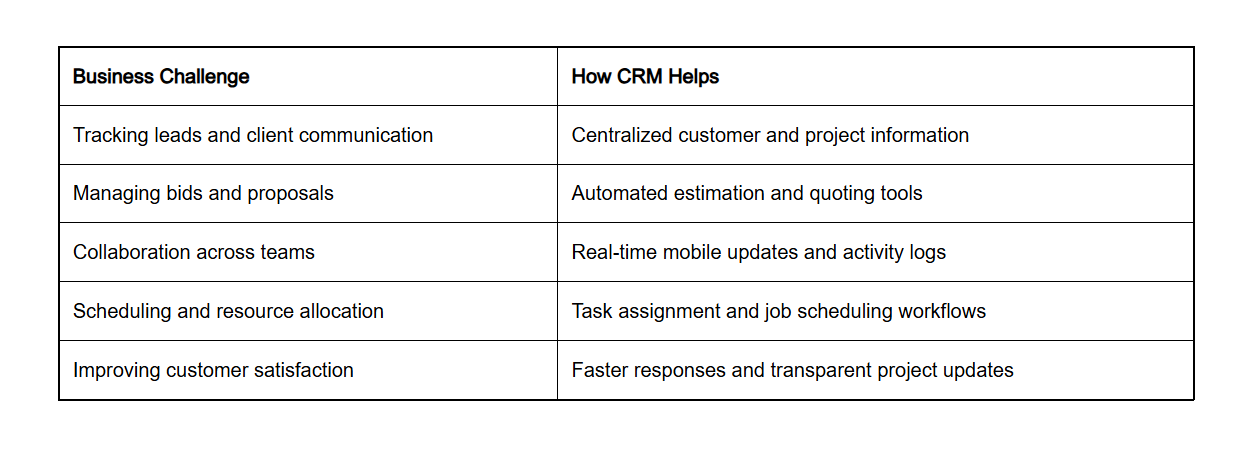
Key Benefits of Using CRM for Construction Companies
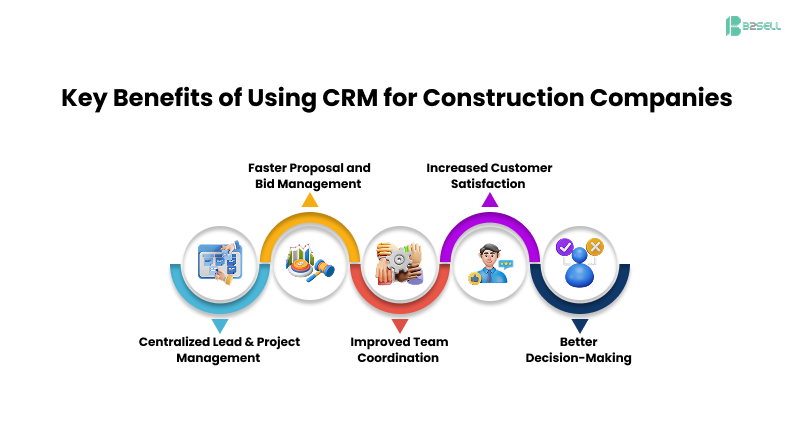
1. Centralized Lead & Project Management
No more scattered spreadsheets or emails. Everything stays in one system.
2. Faster Proposal and Bid Management
Create accurate quotes, proposals, and estimates faster.
3. Improved Team Coordination
Communication becomes organized, timely, and clear across teams and job sites.
4. Increased Customer Satisfaction
Clients stay updated and informed—leading to trust and repeat business.
5. Better Decision-Making
Real-time data helps predict costs, risks, profitability, and project timelines.
🏗️ Key Features to Look for in a Construction CRM
When evaluating CRM software for your construction business, focus on real workflow needs instead of flashy dashboards.
Top CRM Features to Prioritize:
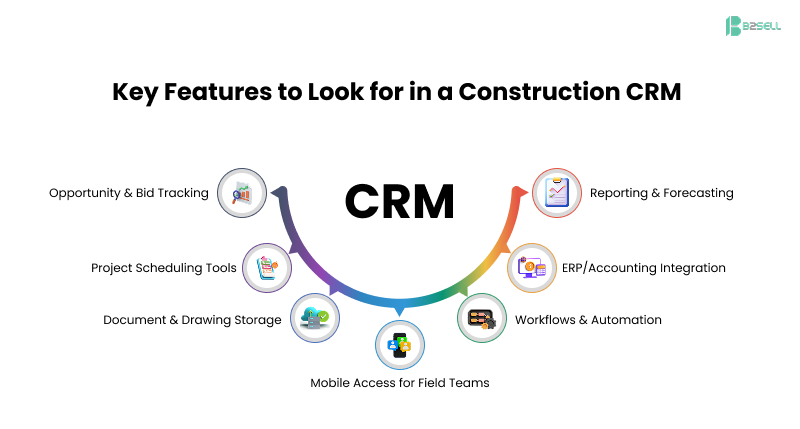
- Opportunity & Bid Tracking – Ensure leads never slip through the cracks
- Project Scheduling Tools – Align tasks, materials, and timelines
- Document & Drawing Storage – Keep contracts & blueprints in one place
- Mobile Access for Field Teams – Jobsite updates in real-time
- Workflows & Automation – Reduce manual communication and scheduling
- ERP/Accounting Integration – Sync data with QuickBooks, Sage, SAP, NetSuite, Epicor P21, etc.
- Reporting & Forecasting – Make better decisions based on real performance
Top 10 CRM for Construction Companies in the USA (2026)
Choosing the right CRM for construction depends on your company’s structure, project size, sales cycle, internal processes, and field coordination needs. Below is a detailed breakdown of the Top 10 CRM for Construction Companies in the USA based on usability, integrations, scalability, mobile accessibility, and workflow automation.
1. Procore
Best for: Mid-to-large construction firms managing complex multi-location projects.
Procore is widely recognized as a leading construction project management and CRM solution because it connects teams—from field workers to finance—to a single system.
Key Capabilities:
- Jobsite project collaboration in real-time
- Financial management & cost forecasting
- Document, drawing & blueprint sharing
- Equipment & resource scheduling
Ideal For:
General contractors, engineering firms, and commercial developers.
Strengths:
- Deep construction-specific workflows
- Integrates with most ERP systems
Considerations:
Pricing is on the higher side for smaller firms.
2. Buildertrend
Best CRM for Home Builders, Remodelers & Specialty Contractors
Buildertrend makes customer management and scheduling simple. It centralizes communication and provides homeowners with a portal to track project updates.
Highlights:
- Lead management & sales pipeline tracking
- Bid & estimate creation
- Timeclock & scheduling tools
- Client communication portal
Why Choose It:
Reduces back-and-forth communication and enhances customer transparency.
Ideal For:
Home builders, renovators, kitchen & bath contractors.
3. Salesforce + Construction Cloud Toolkit
Best for Enterprise Construction Organizations
Salesforce is not industry-specific by default, but when configured with construction workflows, it becomes extremely powerful.
Capabilities:
- Custom project dashboards
- Lead, bid, and subcontractor management
- Automated workflows and approvals
- Field service scheduling (via Field Service Lightning)
Strengths:
Highly customizable + scalable for multi-branch construction companies.
Considerations:
Requires implementation partners & integration setup.
4. JobNimbus
Best CRM for Roofing, Exterior Contractors & Restoration Teams
JobNimbus is built for businesses that need strong job tracking and field service coordination.
Features:
- Drag-and-drop pipeline
- Work order management
- Material & vendor tracking
- Mobile app for field crew updates
Why It Stands Out:
Easy for field workers to use; excellent for roofing and insurance documentation.
5. HubSpot CRM
Best Free CRM for Small Construction Businesses and Startups
HubSpot provides a free CRM that helps contractors manage leads, calls, emails, and appointments.
Key Features:
- Contact & sales pipeline management
- Email tracking and automation
- Meeting scheduling
- Browser-based and mobile-friendly
Strengths:
Cost-effective and very easy to adopt.
Considerations:
For advanced quoting & project workflows, integration with ERP or job scheduling tools is needed.
6. CoConstruct
Best for Custom Home Builders, Designers & Remodelers
CoConstruct simplifies communication, budgeting, and client approvals.
Top Capabilities:
- Estimate & selections management
- Job costing and budget tracking
- Client decision and approval portal
Strengths:
Keeps homeowners, architects, and contractors aligned.
Considerations:
Best for residential, not heavy commercial contractors.
7. RedTeam
Best for Mid-Sized Construction Firms Needing Full Project Lifecycle Management
RedTeam focuses on collaboration, project execution, and contract management.
Features Include:
- Field activity reporting
- Change order and compliance workflows
- Contractor and subcontractor document management
Strengths:
Excellent for firms working with many subcontractors.
8. Pipedrive
Best CRM for Small-to-Medium Contractor Sales Teams
Pipedrive is a sales-focused CRM that helps contractors close deals faster by visualizing the entire sales pipeline.
Key Strengths:
- Simple, intuitive UI
- Automated task reminders
- Mobile-first CRM experience
Best Use Case:
Contractors generating high lead volume (e.g., HVAC, solar installers, roofing).
9. Acculynx
Best CRM for Roofing Contractors & Exterior Construction Specialists
Acculynx includes workflow automation specifically designed for storm restoration and insurance-heavy roofing claims.
Top Features:
- Insurance & claims documentation tools
- Production scheduling & labor planning
- Material ordering integration (ABC, Beacon, etc.)
Strengths:
Purpose-built for roofing crews and job tracking.
10. Monday.com (Construction CRM Setup)
Best Flexible CRM for Any Construction Business Size
Monday.com isn't only a CRM—it's a visual work management platform. With construction-specific templates, it becomes a lightweight, customizable CRM.
Core Benefits:
- Visual Gantt & Kanban workflows
- Team collaboration boards
- Unlimited customization with integrations
Strengths:
Perfect for companies needing adaptable but structured workflows.
How to Choose the Best CRM for Your Construction Business
When selecting a construction CRM, consider:
✅ Company Size
✅ Number of ongoing projects
✅ Budget and required scalability
✅ Need for mobile/on-site access
✅ Integration with ERP, inventory, or accounting tools
Long-Tail AEO-Friendly Q&A
Is CRM useful for construction companies?
Yes. CRM helps manage leads, estimates, projects, communication, and customer relationships efficiently.
What is the best CRM for construction companies?
The best CRM depends on your company size and workflow. Procore, Buildertrend, Salesforce, and JobNimbus are leading choices.
Can a CRM integrate with project management software?
Yes. Solutions like B2Sell CRM Integration connect CRM with project management platforms, ERPs, and accounting systems.
Do construction CRMs work on mobile devices?
Most modern CRMs include mobile apps to support field team access.
Which CRM integrates best with ERP and inventory systems?
B2Sell CRM Integration provides seamless multi-system integration for ERP, PIM, accounting, ecommerce, and quoting systems.
B2Sell CRM Integration: Powering Seamless Construction Operations
No matter which CRM you choose—the real efficiency comes when your CRM is integrated with:
- ERP systems (SAP, Epicor P21, Sage, NetSuite, Microsoft Dynamics, QuickBooks, etc.)
- Supplier platforms
- Estimation & bidding tools
- Project scheduling systems
Why Construction Companies Choose B2Sell CRM Integration
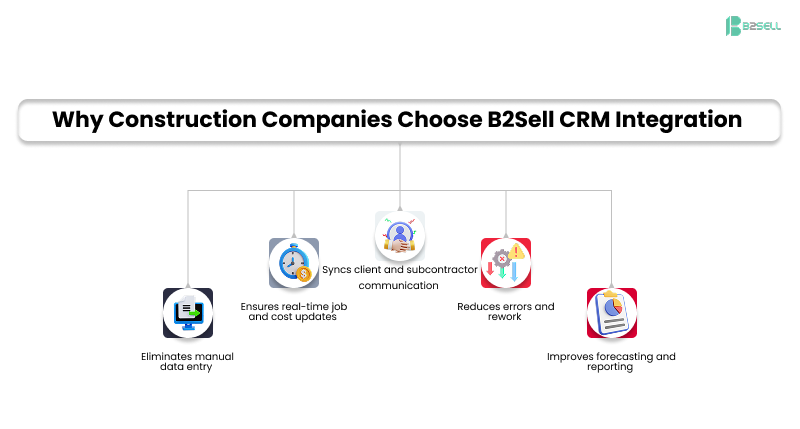
- Eliminates manual data entry
- Ensures real-time job and cost updates
- Syncs client and subcontractor communication
- Reduces errors and rework
- Improves forecasting and reporting
Your CRM should work for you—not create more work.
Conclusion: Elevate Your Construction Business with the Right CRM + B2Sell Integration
A CRM for construction is no longer optional—it’s a strategic necessity.
But the real transformation happens when your CRM works together with your ERP, inventory, and field operations.
✅ Streamline sales, bidding, and project workflows
✅ Improve team coordination
✅ Deliver better client experiences
✅ Scale profitably and sustainably
Ready to Streamline Your Construction CRM Workflow?
B2Sell CRM Integration connects your CRM with ERP, accounting, inventory, and project tools—so your business runs smarter, faster, and more profitably.
👉 Learn more: https://www.b2sell.com/crm-integration
📞 Book a free consultation today- Free Demo



.png)
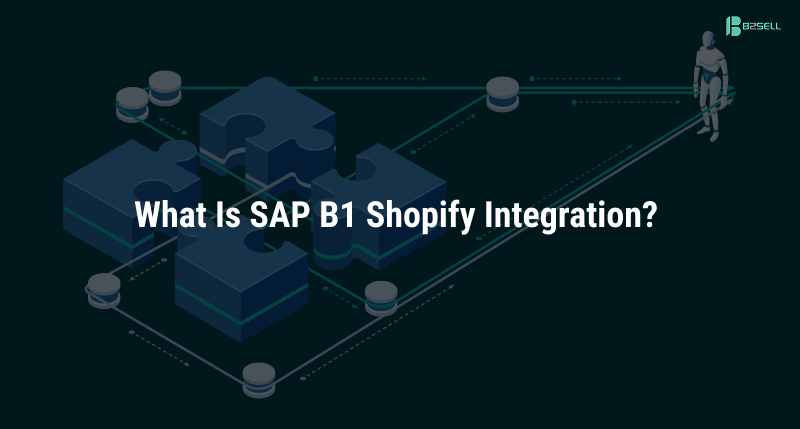


.png)